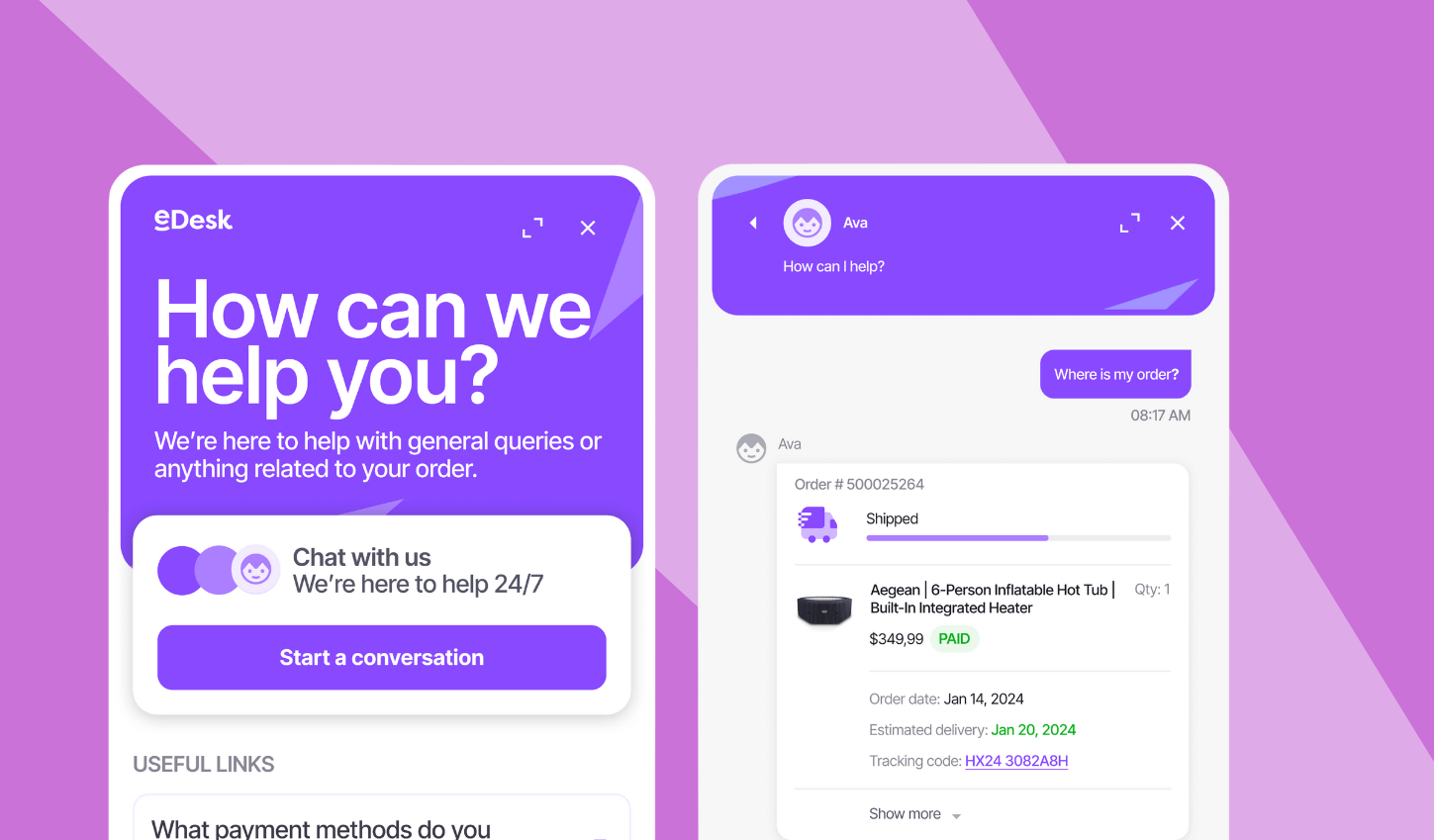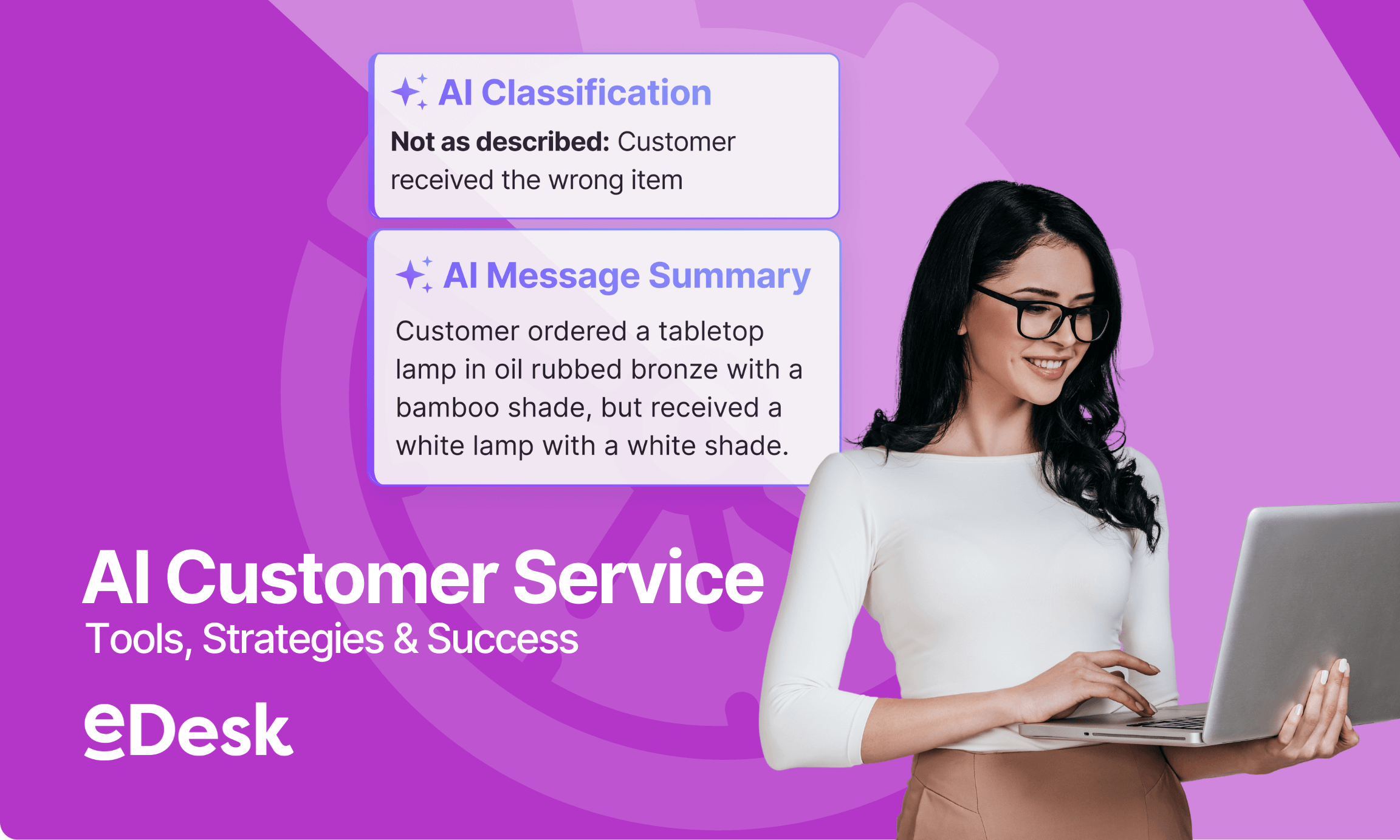AI is revolutionizing customer service across industries, allowing businesses to provide faster, more personalized, and efficient support. From AI-driven chatbots to predictive analytics, companies are harnessing AI to automate customer service, improve experiences, and optimize operations. These changes are making a difference, 59% of consumers now believe generative AI will change how they interact with companies in the next two years. In this blog, we’ll explore everything you need to know about AI for customer service, including what AI tools exist, effective implementation strategies, and real-world success stories from top companies.

How are AI Tools Transforming Customer Service?
1. AI-Powered Chatbots and Virtual Assistants
Chatbots and virtual assistants are among the most commonly used AI in customer service. These tools handle routine inquiries, provide instant responses, and are available 24/7, significantly reducing response times and ensuring consistent support. Notably, 81% of consumers believe AI has become part of modern customer service, highlighting the growing acceptance and reliance on AI-driven interactions.
One of the key benefits of AI in customer service automation is the ability to provide multilingual support, allowing businesses to expand their reach to international markets. Chatbots can be trained to understand and respond in multiple languages, ensuring seamless interactions with customers worldwide.
2. Natural Language Processing (NLP)
NLP enables AI systems to understand and respond to customer inquiries in a human-like manner, facilitating better and more accurate responses to queries. Businesses use NLP-driven chatbots, sentiment analysis, and automated responses to enhance AI-powered customer service. AI uses natural language processing to understand customer intent, process requests, and deliver relevant solutions quickly.
Additionally, NLP can be integrated into voice assistants, enabling customers to interact with AI using natural speech. The development of conversational AI is particularly beneficial for
industries such as healthcare and finance, where users may prefer voice-based interactions over text-based ones. 62% of consumers now expect AI to understand their emotions and context better, reinforcing the importance of advanced NLP in customer service.
3. Predictive Analytics
Predictive analytics leverages AI and customer service data to anticipate future behaviors, allowing businesses to offer proactive and personalized experiences. For example, AI-driven predictive models can forecast customer service needs based on historical data, helping companies allocate resources efficiently and address potential issues before they arise.
Retailers, for instance, use predictive analytics to identify peak shopping periods and adjust customer support staffing accordingly. This proactive approach helps prevent long wait times and ensures a seamless shopping experience for customers.
4. AI-Driven Sentiment Analysis
Sentiment analysis helps businesses gauge customer emotions through AI-powered text and speech analysis. By assessing the tone and sentiment behind customer messages, companies can tailor their responses appropriately and prioritize urgent cases, leading to improved AI in customer service efficiency and satisfaction. With 70% of organizations actively investing in tools that automatically capture and analyze intent signals for customer service, the importance of sentiment analysis is clear.
Brands that monitor customer sentiment can identify emerging trends, allowing them to adjust their strategies in real time. For example, if sentiment analysis reveals a surge in negative feedback regarding a specific product, businesses can address the issue promptly and implement necessary improvements.
5. Automated Ticketing Systems
AI in customer service automation enhances ticketing systems by categorizing, assigning, and prioritizing customer inquiries efficiently. These systems ensure that customer issues are directed to the appropriate department or human agent, reducing wait times and improving resolution rates.
Moreover, AI-driven ticketing systems can learn from past interactions using customer data, improving their ability to classify and route tickets over time. This continuous learning process results in increasingly accurate ticket management and improved customer satisfaction.
6. AI-Powered Knowledge Bases
AI knowledge bases provide instant access to relevant information, enabling customers and support agents to quickly find answers to queries in real time. More than 60% of agents say they could perform their jobs better if they had access to more data to personalize interactions. These self-service solutions reduce dependency on human agents while ensuring customers receive accurate and timely information.
By integrating AI-powered search functions, businesses can enhance knowledge base usability, allowing customers to receive precise answers without sifting through multiple articles manually. This feature significantly improves user experience, one of the many benefits of AI for customer service.
Strategies For Thriving in an AI-Driven World
As AI continues to change the face of customer service, businesses from all industries must adapt to stay competitive. Here are key strategies for thriving in an AI-driven business landscape:
1. Embrace a Customer-Centric AI Approach
It’s important to remember that AI should enhance, not replace, human interaction. Businesses must ensure AI tools prioritize customer needs without losing the personal touch that human agents can provide. The insights AI can give should enhance customer experiences by helping to tailor responses, predict behavior, and improve satisfaction.
2. Invest in AI Training and Workforce Development
AI adoption requires upskilling employees to work alongside AI-powered tools. Businesses should invest in training programs to help employees understand the role of AI in customer service automation, data management, and analytics, in order to foster a collaborative AI-human workforce.
3. Utilize AI for Data-Driven Decision Making
AI’s ability to process vast amounts of data allows businesses to make informed decisions. By leveraging service AI for analytics, companies can identify trends, optimize customer interactions, and improve overall efficiency.
4. Ensure Ethical AI Usage and Compliance
Businesses must implement AI responsibly, adhering to ethical guidelines and data privacy regulations. Transparent AI practices build customer trust and help companies maintain compliance with important laws such as GDPR and CCPA.
5. Continuously Innovate and Adapt
With AI technology constantly evolving, companies that stay ahead of AI advancements, experiment with new tools, and refine their AI strategies will be best positioned for long-term success.

How Can Businesses Implement AI-Powered Customer Service?
1. Develop a Clear AI Implementation Roadmap
To maximize the potential of AI for customer service, businesses must identify specific areas where AI can add value. Establishing clear goals – such as reducing response times, improving customer satisfaction, or enhancing personalization – will help guide the implementation process.
Companies should also involve key stakeholders, including customer service teams, IT departments, and executive leadership, to ensure a cohesive AI integration strategy that aligns with overall business objectives.
2. Start with Pilot Programs
Before deploying AI across all customer service channels, companies should conduct pilot programs to test AI tools, gather feedback, and refine their strategies. Small-scale implementations help businesses assess AI’s effectiveness before full-scale adoption.
By analyzing pilot program results, businesses can make data-driven decisions regarding AI expansion, ensuring that investments yield the highest possible return and work seamlessly within the company.
3. Ensure Data Quality and Security
AI’s efficiency depends on high-quality data. Businesses must ensure customer data is accurate, up-to-date, and securely managed to optimize performance, particularly when using AI for customer service. Implementing strong data security measures is also crucial to maintaining customer trust.
Data privacy regulations such as GDPR and CCPA require businesses to handle customer data responsibly. Ensuring compliance with these laws is essential for building and maintaining trust with customers.
4. Train and Support Customer Service Teams
AI should always enhance existing agent productivity. Providing training for customer service teams to work alongside AI will ensure its integration is smooth and will maximize efficiency.
Businesses should empower agents with AI’s machine learning, allowing them to provide even better customer service thanks to additional data. Instead of spending time on repetitive tasks, human agents can focus on complex inquiries that require empathy and problem-solving skills.
5. Continuously Monitor and Improve AI Performance
AI models require continuous monitoring and optimization. Businesses should track AI performance metrics, collect customer feedback, and make necessary adjustments to enhance accuracy and effectiveness.
AI-powered customer service tools should be regularly updated to incorporate new advancements in machine learning, NLP, and predictive analytics. This continuous improvement ensures that AI remains up-to-date and a valuable asset for customer service teams.
Success Stories of AI in Customer Service
1. McDonald’s AI-Driven Customer Service
McDonald’s is implementing AI in customer service automation across its 43,000 locations to improve service speed and customer experience. AI-powered drive-throughs, predictive kitchen management, and automated customer engagement tools have enhanced order accuracy and efficiency.
AI-driven voice recognition technology allows McDonald’s to take orders more accurately, reducing human error and expediting service times. These advancements contribute to a smoother and more enjoyable customer experience.
2. Amarra’s AI-Powered Inventory and Customer Service
Amarra, a global distributor of formal gowns, has integrated AI into its operations to improve its efficiency as an eCommerce business. By using AI for product descriptions, inventory management, and customer interactions, Amarra has reduced content creation time by 60% and decreased overstocking by 40%. AI-powered chatbots now handle 70% of customer questions, freeing up human agents for complex cases.
By leveraging AI for inventory forecasting, Amarra has also minimized stock shortages, ensuring that customers receive their preferred products without delays.
3. Ulta Beauty’s AI-Enhanced Marketing and Customer Insights
Ulta Beauty has leveraged AI and customer service technology to refine its customer engagement strategies. AI-driven data analytics help the company personalize marketing campaigns and predict customer preferences, strengthening customer relationships and boosting sales.
Additionally, AI-powered product recommendations have significantly increased customer engagement and conversion rates, demonstrating AI’s ability to enhance the shopping experience.
4. eDesk’s AI Automation Success
eDesk’s AI automation tools help businesses streamline customer service operations by reducing response times and improving query resolution rates. Companies using eDesk have reported increased efficiency and higher customer satisfaction levels with agents resolving up to 73% more customer queries across all channels.
Businesses leveraging eDesk’s AI capabilities have been able to scale their customer service operations without increasing operational costs, demonstrating AI’s cost-saving potential.
The Future of AI in Customer Service
With technology rapidly advancing, AI’s role in customer service will continue to evolve, with advancements in machine learning, voice recognition, and automation. Businesses that invest in AI-powered customer service solutions will gain a competitive edge by enhancing customer experiences, reducing operational costs, and improving overall efficiency.
From intelligent automation to hyper-personalization, the future of AI in customer service is promising. One thing is for certain – companies that embrace these innovations meet customer expectations and drive long-term success. Ready to start using an AI-powered customer support system? Try eDesk for free today.

